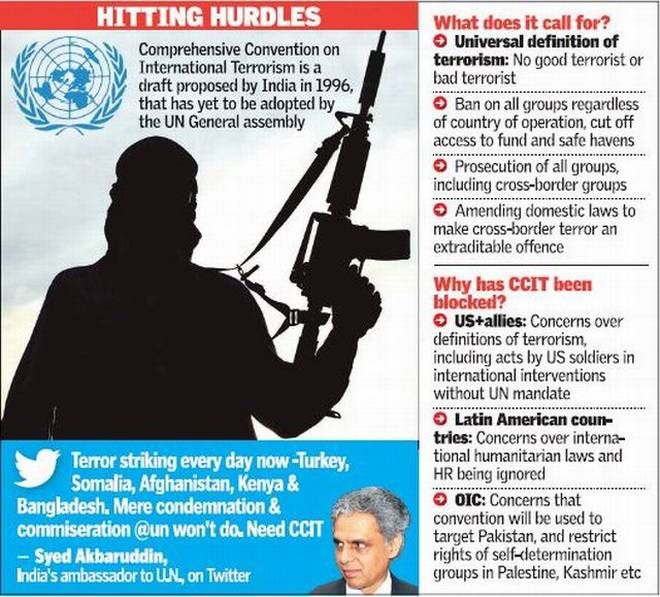

In her recent speech at the 71st session of United Nations General Assembly (UNGA), foreign minister SushmaSwaraj appealed the global community for early adoption of the Comprehensive Convention on International Terrorism (CCIT).
Issue
Context:
- In her recent speech at the 71st session of United Nations General Assembly (UNGA), foreign minister SushmaSwaraj appealed the global community for early adoption of the Comprehensive Convention on International Terrorism (CCIT).
About:
CCIT
- It is a proposed intergovernmental convention which will provide legal teeth to prosecute terrorist acts as it intends to criminalize all forms of international terrorism and deny terrorists, their financiers and supporters access to funds, arms and safe havens.
- India first proposed formation of CCIT at the UN back in 1996.
- Over the years, negotiations are stalled due to differences over the definition of terrorism.There is different understanding ofdefinition of terrorism mainly due to distinction made between-
- “Terrorist organisation” and a “liberation movement”.
- “Good terrorists” and “bad terrorists”.
- A series of terror attacks since the beginning of the year in India as well as in Bangladesh have revived the Indian diplomatic establishment’s interest in voting and early adoption of the anti-terror convention
Objectives of draft CCIT as proposed by India:
- To have a universal definition of terrorism that all 193-members of the UNGA will adopt into their own criminal law.
- To ban all terror groups and shut down terror camps.
- To prosecute all terrorists under special laws.
- To make cross-border terrorism an extraditable offence worldwide
Recent Developments
- The Shanghai Cooperation Organisation (SCO) has recently supported comprehensive UN treaty on fighting international terrorism should be passed by reaching consensus based on UN documents such as the Charter of the United Nations.
- It also suggested that the global community should pool its efforts to counter young people in getting into extremist, terrorist groups.
- The discussions over such Convention have yielded three separate protocols that aim to tackle terrorism:
- International Convention for the Suppression of Terrorist Bombings,1997
- International Convention for the Suppression of the Financing of Terrorism, 1999
- International Convention for the Suppression of Acts of Nuclear Terrorism, 2005.
Analysis
Arguments in favour ofCCIT
- CCIT provides a holistic approach and collective action to tackle terrorism.
- It will be different from existing, nearly 14 conventions, as provides a legal framework which makes it binding on all signatories to deny funds and safe havens to terrorist groups.
- This result into the ban of all terrorist groups without taking into consideration their objectives or country of operation.
- It will further corner Pakistan and create international pressure on Pakistan to act on its state sponsored terrorism.
- It will also have the provision to amend domestic laws to make cross-border terrorism an extraditable offence.
Opposition
Despite India’s efforts to push a global intergovernmental convention to tackle terrorism, the conclusion and ratification of the CCIT remains deadlocked, mainly due to opposition from three main blocs – The US, the Organization of Islamic Countries (OIC), and the Latin American countries.
- All these three blocs have objections over the “definition of terrorism” and seek exclusions to safeguard their strategic interests.
- For instance, the OIC wants exclusion of national liberation movements, especially in the context of Israel-Palestinian conflict.
- The US wants the draft to exclude acts committed by military forces of states during peacetime.
- Latin American countries have reservations about international humanitarian laws and human rights being ignored.
Way forward:
India has been a victim of cross-border terrorism for the last 40 years. It has taken cognizance of the threat terrorism poses to international peace and security long before the major world powers. Far from conclusion, India needs to keep lobbying overtime so that global community acts with fresh resolve and urgency inadaptation of this critical Convention
The CCIT is currently being discussed at the Sixth Ad Hoc Committee of the United Nations. The committee is the primary forum for the consideration of legal questions in the UNGA
Learning Aid
CCIT in a nutshell:
Practice Question-
The Comprehensive Convention on International Terrorism is a proposed treaty which intends to criminalise all forms of international terrorism and is indeed the need of the hour. Despite this, there has been a deadlock in its acceptance. In the light of this statement, analyse why the treaty’s adoption is important for India. Also, discuss challenges in its adoption.


